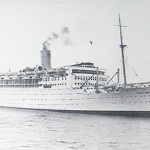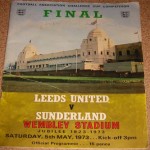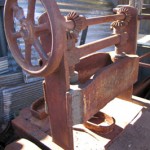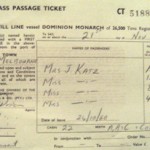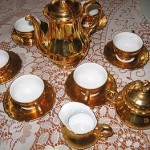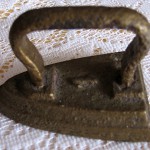English
Stretford, Manchester, England
Tilbury Docks, London, England on 6 February 1955
Sydney on 14 March 1955
Fairbridge Farm School village & farm, Molong, NSW (child migrant scheme near Orange) for 13 years
Rural property at Tottenham, near Nyngan, north-west NSW
Fairbridge Farm agricultural/domestic trainee
Property work in Tottenham; farm labourer in Nyngan; dairy manager in Wellington; railyard worker and self-employed truck driver in Sydney; security work in central-west NSW.
Stewart Lee’s migration memories
We lived in Stretford in Manchester. I was only four year old when we left and don’t remember much about England.
I was the youngest of four [of my siblings] coming to Australia. Apparently my father or my mother signed papers. They were told we were coming out for a better life. To us it was going to be a holiday!
We dressed up nicely and neatly but it wasn’t to be ‘cause as soon as we got to Fairbridge [Farm in Australia], the clothes were ripped off me and I never seen them again.
I was in the boat cabin a lot because I was seasick. I remember vaguely Aden when we pulled up along the Suez ‘cause of all the camels and the baskets on rope.
My biggest recollection was getting to Fairbridge. We got there by train from Sydney. They took you to your cottage you were going to live in and from then on hell broke loose. Simple as that. I was told to take my clothes off and I wouldn’t do it. They held me down and tore me clothes off.
Me brother Graham and I were at Mort Cottage. Oh, I wasn’t happy about [being] separated from Syd and Smiley cause I was always used to being with me brothers and I don’t know why they didn’t leave us together. That’s Fairbridge’s way of doing things. You can’t do nothing about it.
I’d go with the other kids towards school and then I’d have to come back because I [was too young for school]. I was the only one left in the village. The holiday had ended ‘cause it was only a day or two and I was already picking up woodchips for the heaters, for the boilers. Each kid had a job to do.
The second day I was there, the bell rang [and] woke you up. You get out of bed, get your towels and straight in the shower. There was a rule [to have a] three minute cold shower early, about six o’clock. And let me tell you it was cold, real cold. One of the kids held me there – it was freezing. Supposed to toughen you up apparently.
As you got older, I think I were six year old, you go up the dairy, harness the horse, put the cart on and back the horse in ready to bring the milk to the village. Once you get down to the village, you have breakfast, then you had to race home, get changed and off to school. Oh, [Fairbridge Primary] school was alright.
I was six when I killed my first sheep. That was an experience and a half! Cutting the poor old sheep’s throat and of course when he started kicking, being only a little kid, knocked me head over heels and by the time I got up to break the sheep’s neck he had died from loss of blood anyway. I got a belt in the ear from Begley, the dairy manager, for not killing him straight away. Or it would either be a boot up the bum or a closed fist. Very common. In the corner you couldn’t escape the punches.
I was about eight and because I was struggling to lift a six gallon urn of milk and dropped it down and dented the bottom, I got a hiding. How kids never had hernias? I put any Fairbridge kid up as a worker against any man, they’d leave them for dead as far as work goes. Rather than put us on as boys to be farmers and girls to be farmers’ wives, they should have put us in the army. We’re used to being ordered around, told what to do.
As you got older I was getting up at three in the morning to bring the cows in, milk, scrub the bowls. Then have your breakfast, up to the cottage, get changed for school, then bus to Molong [High School] which was four mile away.
I like to remember the good times. We made our own fun as kids. You didn’t get many hours to yourself so you just go down the creek for a swim. We had scouts, we had cubs. I enjoyed doing that ‘cause you got away from it all. Other than that, there wasn’t any real freedom.
The camaraderie amongst the kids was the whole crux of our survival. You were basically ‘little England ‘ inside Fairbridge because you didn’t associate with people outside. That’s why we kept our accents. You were locked inside even when you went to high school – Fairbridge kids were frowned on by Molong kids. I was classed as a rebellious dumbo. We stayed in our own little group ‘cause that was where we were safe. If one got into trouble, the others were always there.
It’s like we were little orphans. Well, we wasn’t. This was one of the biggest mistakes people made. Most of us had parents and other siblings in [the UK].
We used to be made to write letters [to family] but it was a waste of time unless you could get it to one of the kids in Molong. All letters incoming and outgoing were read by the staff. If they didn’t like it, they would go and see [the principal]. Mr Woods used to look at it, rip it up, throw it in the bin. That’s why kids used to ask Molong kids to post their letters. Not that there was many that would do it anyway.
Mum wrote quite a few letters. I wrote a lot of letters. When I was older I found out that my mother didn’t get ‘em, sisters didn’t get ‘em. I‘d been annoyed earlier but I weren’t so much in the end.
I was nearly 15 when I left school to be a Fairbridge trainee. I worked in the kitchen, worked up the farm, but I done a lot more dairy than any of the others. Later in life, I fixed it up. Begley took a few swings at me and I grabbed him and told him if he touches me or another kid, I’ll kill him. He reported it to Newbery, the principal at the time. I told him I’ll kill him too. I had had all them years of being kicked and punched around. There was kids smaller than me and they were going through the same thing I went through and I just had enough of it. The violence towards the kids was brutal.
You were [at Fairbridge] to work. Once you got to the age to go, boom, you’re stuck out on a property [and] used as the owner saw fit. I didn’t even know I was going. They just turned round, said, “Right, into Orange ”. They got me a pair of pants, a pair of boots, and a couple of other odds and ends and a suitcase. Next morning I was on my way to Tottenham, at 17. So they didn’t prepare you for outside, they just dumped you there.
Tottenham [was] in the middle of nowhere. The people who owned the property worked you like a workhorse. Apparently this happened to all Fairbridge kids. They reckoned they owned us and this is the idea Fairbridge gave them. It wouldn’t have been no different to the cotton mills in England if we stayed in Manchester.
Wages were very meagre ‘cause half go back to Fairbridge. We never seen [this] money. I had an argument with the boss at about six months and worked in Nyngan for a while. They were no different. I was doing farm work: fencing, labour and garbage jobs that they didn’t want to do. It was below their level.
Next was Wellington. I managed the dairy on my own there. I had no problems. I lived in a steel caravan [with] a bed. No cupboards. It was like a bloody furnace in summer, like a freezer in winter. When they moved to their other property, I was living inside the house which was a wreck. It hardly had a roof on it. You couldn’t have a shower unless you wanted a cold one. Well, I’d had enough of them! So you have a bath – they had washing machines to heat the water.
A few other Fairbridge kids in Sydney had jobs on the railways. I worked on the platforms at Town Hall station. I still weren’t 19 so I shouldn’t have been out shunting – making up trains, separating them, wheat trucks, coal trucks, stock cars – but they said [I was] close enough, so I stayed shunting the rest of the [22] years I was on the railways.
I was happy. I actually enjoyed it. I was getting paid for working and I got to the stage where no-one would ever stand over me again. The only reason I gave it up was the amount of injuries I had.
Ah, well, while I was holding onto the side of a wagon, the timber shifted and crushed me fingers. Another time, I fell under a wheat train. The whole train went across me. And when I got up, it actually stripped every bit of clothing off me. I had no skin on my back. One bloke fainted when I stood up but I was one of the few that ever came out of being under a train alive because I didn’t try and get out. I just stayed there. My leg never broke in the normal positions. It split right up the middle of the bone which was worse and as you get older, winter comes and you can feel it, I can tell you.
We were never schooled in the art of compensation. Basically, I think it comes from being at Fairbridge – you weren’t supposed to argue about getting compensated, you were just supposed to work.
I left the railway. I bought a truck. Ten years driving. I enjoyed that too because I was me own boss. I was pulling in about $1,200 a week and life was real good. Then the company folded and I have been in security ever since.
It was too much trying to live in Sydney so we look[ed] up bush, [but] I didn’t want to move until the kids were going into high school. I wanted them to have a better education than I did and the wife was the same. You make sure your kids don’t cop what you copped.
My brothers? Smiley was a bit hard to keep in touch with. He was like me, a nomad, moved around a fair bit. Once I got married that tied me down a bit. Graham was at Nyngan, then he moved to Canberra, then Queensland. Syd was stable, he was in Wallerawang which was no trouble. So out of the three brothers, Syd was the main one I kept in contact with – I could get a train, jump on my motorbike or go in the car.
Mum come out to Australia. It was the first time I had seen Mum in about 30 odd years. I never bothered pressuring her about why we were sent out here. She’s still my mum regardless, you know. Mum had her ideas I suppose, Dad had his ideas. Ah, people thought I was strange doing that. I don’t think so because you think you are doing the right thing at the time so why should you get castigated over it? No, I never held that against Mum or Dad.
It was 40 years by the time I got over to England but I couldn’t get an Australian passport. How can I be told I was an immigrant and an alien yet also be a ward of the state in Australia when I am English and never nationalised? I’ve never forgotten that. So I got an English passport.
I [met the] five siblings [who] didn’t come over – we had to cram 40 years in one month. Smiley found another sister we never knew about and it’s quite interesting meeting her. It was interesting enough meeting my own sisters and brother ‘cause we hadn’t seen them for that long. They were telling me they’d written letters [to Fairbridge] but I didn’t get them.
Me and my son, Stewart, we’re trying to get some money to go back over there. I love England. I just like Manchester, simple as that. When me and Stewart got over there, we got to Manchester and I was home again, you know. It’s a hard thing to explain, but it’s just one of them things.
When I was asked to be interviewed for David’s book on Fairbridge, I was up for it. The story of them kids have never been told. You didn’t know what was happening to some other kids. They never spoke about it. The sexual assaults didn’t surface. It was a closed shop. So when David said to go for it, we did! Some hadn’t talked about it before. Although they were nervous, once they started, they couldn’t stop. For them to talk after all them years, it takes a lot off their head.
I had a lot of flashbacks. A lot came after the interview and [reading] the book. Like getting the hell kicked out of me but also the good times. Fairbridge will always leave me on the defensive but I’m a bit luckier than most because at least I can talk about it, others couldn’t. They’re in self-denial.
I’m very happy with the book. Fairbridge was a lot more horrific – the book only scratched the surface. Me kids, when they read it, they got upset. But at least I can answer their questions. Me wife and children have put up with me talking about Fairbridge for 33 years – they deserve a medal. There are still things I haven’t told. That will come when it comes. My wife understands.
Interviewed by:
Andrea Fernandes, NSW Migration Heritage Centre on 6 February 2007
With assistance from Ian “Smiley” Bayliff and David Hill.
Visit the Fairbridge Heritage Project page for information on the CD-rom, The History Of The Fairbridge Settlement, Molong, by Ian “Smiley” Bayliff and David Hill and the publication, The Forgotten Children, by David Hill.


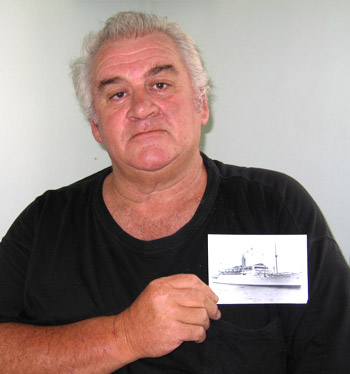

![Graham, Syd, Stewart and Smiley - brothers about to migrate, Knockholt, Kent, England, February 1955 "I'm the little one in the chair. We dressed up nicely and neatly, but [when] we got to Fairbridge [Farm in Australia], they held me down and tore me clothes off. I never seen them again."](../../../cms/wp-content/uploads/2008/10/bros.jpg)
